- Home
- K. A. Tucker
Say You Still Love Me: A Novel Page 2
Say You Still Love Me: A Novel Read online
Page 2
“I’m not running to my daddy about issues with Tripp.” What would that do, besides prove that I’m not ready to be in this position, let alone take over when he retires? “It’s on me to handle, and I’m handling it.”
He aims and tosses the apple core across the room, into my trash can. “Where is the silver fox today, anyway? I thought he was back from Tokyo already.”
I smirk, my gaze drifting to the closed office door at the end of the hall. My father, an arresting presence in any room, is more attractive and fit at sixty-six years than a lot of men two decades younger. Which is why he has no problem finding women three decades younger to date. “Industry meeting.”
“Oh, right. He’s shooting eighteen at Bryant Springs. He told me about that.”
I roll my eyes. Of course he told David. My father tells David everything. They text like schoolgirls. David is the son Kieran Calloway never had, despite the fact that he has a son. Rhett, my older brother, a guy who wants nothing to do with the corporate world. Or my father.
My father was joyous when David and I announced our engagement and furious with me when I ended it. There was a point, right after the breakup, when the very air circulating around David and me was toxic, when I asked him to fire David. He told me he’d do no such thing because his quasi son is too good for the business. Then he kicked me out of his office for even coming to him to suggest it.
I considered quitting out of spite, but decided I’d already given David enough of my past; I wasn’t going to lose my future because of him, too.
Silence lingers in my office.
And then David sighs wistfully and waves a hand between us. “This is nice, isn’t it? Us, talking like this again?”
“Yeah. It is,” I concede.
“Let’s do it again sometime. Like over dinner tomorrow—”
“No.” I stand and round my desk, heading for the door. It’s the only way I’ll get rid of him. “It’s over and you know it.”
“It wasn’t all bad times, Piper. I seem to remember you enjoying some of it a lot.”
I turn to find his heated gaze drifting over my legs, my hips, my chest, before settling on my face. His lewd thoughts are practically scrawled across his forehead.
My cheeks flush. “That part was never our problem.” It’s one instance where David has never been selfish, though I think it may have more to do with him wanting glowing reviews when his conquests kiss and tell. And it was easy to ignore our deeper issues when the wild chemistry between us drowned everything else out.
That last time we were together, after I called off the engagement, when I came to collect my last few things and he begged me to “talk” . . . well, that was a moment of sheer stupidity on my part. One I’ll never repeat.
David finally heaves himself out of the chair. “You just have to stop being so uptight about everything.”
I take a deep, calming breath. Four months post-breakup and he has yet to accept an ounce of responsibility for our demise. “Who you are and who I am are not compatible. You’ll do best with a spineless trophy, someone who’ll let you walk all over her whenever you feel like it.” I pull the door open. “Go forth and find thee thy perfect doormat.”
He pauses at the threshold, a mere foot away, close enough that his Tom Ford aftershave fills my nostrils. That scent alone used to get my blood rushing. “You say that now, but I doubt you’ll like it when I start dating again.”
“Let’s test that theory out.”
“Fine. I’m going out to dinner with Vicki tomorrow. You remember her, right? That sexy blonde from the gym. She’s been after me for years. Pretty sure she’ll be staying over.”
“Tomorrow, you say?”
“Tomorrow.” He smiles smugly as he peers down at me, waiting for a reaction.
“Didn’t you just ask me out to dinner tomorrow? Because having dinner with your ex-fiancée when you already have a date for that night is sleazy, even for you.”
“I . . . We . . .” He stammers, caught in his lie. “I meant, hypothetically, I could go out with her.”
I chuckle. “Sure, right.”
“That’s not the point.” His expression sours.
“No, the point is that I don’t care who you date, screw, or marry,” I usher him out with a hand against his broad back, “as long as you accept that it’ll never be me again.” I push my office door shut with a heavy sigh.
I believe that, deep down inside, David knows we don’t belong together. He’s just not the kind of guy to accept losing. It’s not something his ego can handle.
But is this what my life has become?
Managing fragile male egos all day long?
I groan into my empty office.
The elevator corridor in the lobby is eerily empty when I step out onto the ground floor just before one P.M., though evidence of a recent pizza delivery lingers in the air. It won’t remain quiet for long, as any number of the six elevators are surely about to open, delivering a small horde of tenants and visitors from the twenty-four floors above.
My heels click against the travertine as I march through the atrium, past rows of planters brimming with palms and ferns. Midday sunlight streams in from the glass dome above, broken up by an archway of crisscrossing beams. Our lobby is an architecturally stunning masterpiece, designed by Fredrik Gustafsson, the very same man at the helm of the Waterway project.
We own this building, though we occupy only five floors of it, renting out the rest to a host of companies in the finance, insurance, and real estate sectors. The land was part of a smart investment by my father, who began quietly buying up defunct industrial properties around Lennox’s waterfront decades ago, around the same time that he began lobbying to city officials that the neglected area could be revitalized into an urban mecca. Slowly, he’s had the ramshackle mills and warehouses demolished, the area rezoned, and, project by project, has brought the area—now pegged Augustin Square—back to life.
“Off to lunch, Miss Calloway?” a baritone voice booms as I pass through the security gate.
I turn to find Gus grinning at me. I’ve known the cheerful security guard with the Jersey accent since I was wearing pigtails and Mary Janes. He was getting on in age even back then. Now, his tight gray curls are a stark contrast to his deep brown skin. But, while he could retire, he’s shown no interest in doing so.
Gus has become as much a part of CG as my father. When we moved buildings, my father specifically asked Rikell, the company that we contract our security resources from, that Gus come with us. And by ask, I mean he told them that if Gus wasn’t coming, neither were they, to this building or any others that he owns.
My father isn’t the easiest man to negotiate with.
Not only did Rikell oblige, but they gave Gus a promotion to supervisor, managing schedules and staff onsite, and having final hiring say on the guard staff. But still, Gus sits at this front desk, greeting every building occupant by name, breaking up the monotony of the daily grind in the most pleasant way.
“What’s it gonna be today?”
I can’t help but grin back. “Not sure yet. Something good.” We’re a seven-minute walk to the Pier Market, a long, narrow construct packed with vendors and a popular locale by the river, where you can find everything from fresh-cut flowers to lobsters to French macarons. Around it is an array of restaurants, peddling every culinary taste imaginable. I’ve gotten lost in the menus posted outside the doors on many occasions, drooling over the idea of a comforting moussaka or chicken biryani or green curry for lunch.
I always end up bringing back a salad.
“Oh, I’ll bet.” Gus grunts, knowing as much.
I make a point of leaning over to brush the dusting of fine white powder from his uniform shirt pocket. “Have you been eating donuts again?” Talk about embodying a stereotype.
“Not just any donut!” he scoffs. “They’re these . . . oh, I can’t remember what Basha called them, but they’re covered in icing sugar, and have this plum jam
filling inside.” He smacks his lips. “I’ll save you one next time.”
My eyes narrow. “And exactly how many did you eat, Gus?”
“Just the one.” He averts his gaze to a stack of papers on the desk.
“Four. He ate four donuts for lunch,” says Ivan, the young security attendant with a dark olive complexion and an excessively thick neck sitting beside him. He emphasizes that by holding up four fingers.
“It’s a good thing you’re leaving next week, you rat,” Gus mutters before flashing a sheepish smile my way. “Basha said they were best eaten fresh.”
“Oh, well then that makes complete sense.” I shake my head. Ever since Gus’s wife died of an aneurysm five years ago, his waistline has been growing at an exponential rate. Sometimes I think he’s intentionally eating like this to shorten his days so he can join her in the afterlife. “I’m bringing you back a salad.” I give the counter a pat, as if passing my judgment with a gavel, and then head for the exterior doors.
A man steps out from behind a closed door ahead of me and begins heading for the same exit. He’s in simple business attire—black dress pants and a white button-down shirt that looks extra crisp with a gold tie—that clings to his solid, muscular body in the most pleasing way.
After spending two years with David, fit bodies alone don’t immediately grab my attention anymore.
But there’s something about this guy . . .
The way he moves, that slender nose, the shape of his forehead, that hair color . . .
It’s been years, and he looks so different, but . . .
I frown and my feet falter as I watch him climb the steps. No. It can’t possibly be him.
It can’t be the boy who broke my heart.
“Kyle?” I call out.
Chapter 2
THEN
2006, Camp Wawa, Day One
“Is that where we’ll be eating?” I crinkle my nose at the pavilion to our left. Two faded crimson oars crisscross the front, “Camp Wawa” scrawled across each paddle in white. The picnic tables lined up beneath the covering, on the other hand, look freshly painted, and in every color under the rainbow. There must be at least twenty of them.
My mom smiles wistfully at the structure. “Your cabin will pick a table and scribble all over it. It’ll be yours for the summer.”
“Sounds great.” I eye the dozens of sparrows that hop along the tables. Pooping, probably. As birds do. I sigh heavily. “Is there still time to quit and go to Europe?”
“You’re going to love it here, Piper. Trust me.” Nothing I say seems to dampen the nostalgic buzz that’s been radiating off my mother since we crossed an old one-lane bridge, about a half hour ago. “Being a summer camp counselor is a critical milestone. I wish more people got to experience it.” She turns the car into the parking area, hand over hand before shifting back to the ten-and-two position, as if demonstrating proper driving skills. That’s how she always drives. “You’ll make friends for life here. People you can call up twenty years from now, for anything, and they’ll be there for you. I promise, you won’t forget these days, ever.”
“Most traumatic events are hard to forget.” I watch four teenage girls trudge past Mom’s car like a pack of Sherpas, giant backpacks strapped to their bodies, fluffy pillows and sleeping bag rolls tucked beneath their arms. Their matching messy ponytails and cut-off jean shorts prove what my mother warned me of this morning when I entered the kitchen in a silky patterned sundress and jeweled sandals—that I’m highly overdressed for Camp Wawa’s counselor orientation day. “And I’ve been to camp before, remember? White Pine? I hated it.” Falling asleep to the sound of three roommates breathing for four weeks? Not a shred of privacy unless you locked yourself in the bathroom? No, thanks.
“That was not a real camp. Real camps don’t put their kids up in suites and serve meals on fine china. That was Constance’s influence, and I should have known better than to ever listen to her,” she mutters bitterly, throwing the car into park. She and my dad’s mother will only ever see eye-to-eye when they’re both six feet under, their corpses facing each other. “And, besides, you’ve never been a counselor before. It’s a whole different ball game.”
I sigh. “But why does it have to be at a camp three hours away from home?”
“Oh, look! They still have the wishing well!” she exclaims, ignoring my grumbles, waving her lacquered fingernails toward a circular stone-and-wood structure. The lake peeking through the row of tall, scraggly pine trees beyond it is a dark, cold, uninviting blue. “This brings back so many good memories. I always looked forward to my summers here.”
“You grew up in a whole different world than me, Mom.” Public school and family camping vacations at state parks; a tiny two-bedroom farmhouse and sharing a room with Aunt Jackie; drugstore hair-dye boxes and Sears shopping sprees once a year for back-to-school. A station wagon with a gaping hole in the floor of the front passenger seat, if Gramps’s stories are true.
It’s a far cry from the life she married into, the life I know—of a sprawling six-bedroom luxury home, of private school that costs more than many people earn in a year, ski vacations at our Aspen chalet in the winter, and lazy summer days at our beach house on Martha’s Vineyard, if we’re not jetting off somewhere. I know I’m lucky, and I never take it for granted. But gratitude only goes so far. “If you’re going to force me into this—and, by the way, I’m pretty sure there are parenting studies that speak out against this sort of thing—couldn’t I have at least gone to White Pine?”
She glares at me. “You just said you hated White Pine!”
“Yeah, but at least the rooms are air-conditioned.” The website for this place says I’m going to “become one with nature in a charmingly cozy cabin that holds ten campers and two counselors.” Translation: packed into a crowded, stuffy shed for the next eight weeks. With bugs.
“Trust me, Piper. We’re doing you a favor. It’ll be good for you to experience another side of life. The normal side. I’ve tried my best to keep you grounded, but . . . this’ll help teach you to be more conscious of our wealth.”
I struggle not to roll my eyes. Mom’s always talking about how we should try living a more “normal life,” like “normal people.” Ironically, the topic usually comes up as she’s flipping through the catalogue for her next new sports car, or writing a check to pay the caterers for the latest party she’s hosted, or pouring a celebratory glass of pricey cognac for my father when he closes his latest multimillion-dollar deal.
Hell, we drove here in her Porsche!
The truth is, she may not have been born into money, but she has slid into the role of a prim and proper socialite wife to a business tycoon husband so smoothly, no one would ever guess her modest upbringing.
Though, I fear that role is about to change to that of ex-wife.
“So making me do this has nothing to do with you and Dad wanting the summer alone to sort out the details of your divorce?” I finally dare ask, my voice cracking slightly at that last word. One I never imagined uttering in relation to Kieran and Alison Calloway.
Mom shoots me a look but doesn’t offer an answer, drumming her fingers on the steering wheel instead. Her official stance has always been that marital problems are between the adults and not up for discussion with the children. The fact that I know about the “mistake” my father made with a redheaded architect in LA and that a divorce lawyer’s business card slipped out of Mom’s wallet a few weeks ago hasn’t affected her refusal to divulge anything thus far.
“Mom . . .”
“I’m spending a few days at your aunt Jackie’s and then heading out to the summer house so I can think.”
“And are you going to let Dad visit?” I press, a hint of a pleading tone entering my voice. Their raised voices have carried to my bedroom more than once, as of late. My father, insisting that he fly out for the weekends so they can “work things out and move on.”
My mother, insisting that he not.
“
He said he was sorry, Mom,” I offer more softly. It feels like the right thing to say in a situation that I’m still struggling to wrap my head around. It also feels like a last-ditch effort to avert what I’m guessing is inevitable.
Her eyes blink in rapid fire to fight the threatening tears from spilling. “I’m trying, Piper,” she whispers hoarsely. “But what he did was—” Her lips purse tightly, as if to seal away the rest of that sentence from escaping, as if too much has already been divulged.
My chest tightens with this rare display of vulnerability from my mother, who keeps her mask of confidence and self-assuredness in place at all times.
What he did was break her heart.
I swallow against the forming lump in my throat and try a different angle. “I deserve to know if I’m coming home to a ‘For Sale’ sign on our lawn, don’t I?” I haven’t seen any real estate agent cards slip from her wallet as of yet.
It’s a long moment before I catch the soft sigh and subtle nod. She clears her throat, and the calm, collected façade is back. “You and your father have a special bond, and I don’t want to say anything that might damage that,” she begins carefully. “Our problems don’t begin and end with his . . . indiscretion.” Her jaw clenches with that word. “Things have not been going well for some time.”
“Is it because he works so much?”
“That certainly doesn’t help.”
For Kieran Calloway, time has always been a valuable commodity, awarded mostly to one business meeting or the next, and never wasted. He’s rarely on time for dinner, and usually comes late to our family vacations and leaves early, granting us no more than five or six days at a time, half of that spent on the phone or his computer.
And yet, for as long as I can remember, he has always found time for me. I used to sit on his lap in his office and make him explain the latest building designs to me over and over again, a thousand “why” questions rolling off my tongue, his display of patience a rarity, seemingly available only for his baby girl. I remember looking out on the city as he’d describe with passion how he wanted the skyline and the downtown core to look one day, drawing in the air with his fingertip. I’ve always been in awe of him—of how he can take an idea and then convince all these people to help him make it a concrete-and-glass reality.

 The Simple Wild
The Simple Wild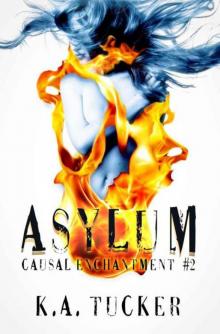 Asylum
Asylum Anathema
Anathema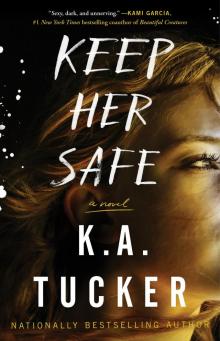 Keep Her Safe
Keep Her Safe Chasing River
Chasing River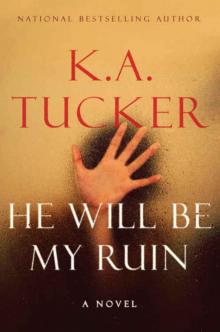 He Will Be My Ruin
He Will Be My Ruin Four Seconds to Lose
Four Seconds to Lose The Simple Wild_A Novel
The Simple Wild_A Novel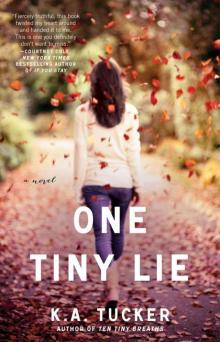 One Tiny Lie
One Tiny Lie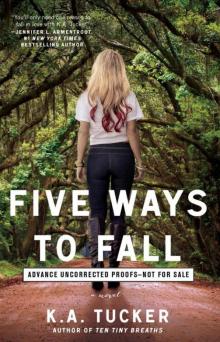 Five Ways to Fall
Five Ways to Fall Until It Fades
Until It Fades Allegiance
Allegiance Say You Still Love Me: A Novel
Say You Still Love Me: A Novel Burying Water
Burying Water The Player Next Door: A Novel
The Player Next Door: A Novel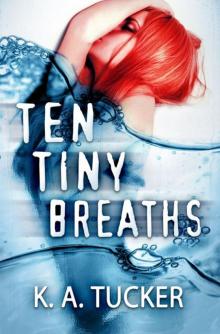 Ten Tiny Breaths
Ten Tiny Breaths A Fate of Wrath & Flame
A Fate of Wrath & Flame Forever Wild
Forever Wild Anomaly
Anomaly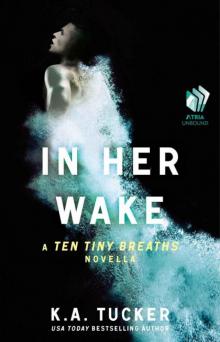 In Her Wake
In Her Wake Surviving Ice
Surviving Ice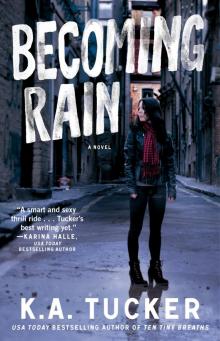 Becoming Rain
Becoming Rain Running Wild: A novel
Running Wild: A novel Four Seconds to Lose: A Novel
Four Seconds to Lose: A Novel Four Seconds to Lose ttb-3
Four Seconds to Lose ttb-3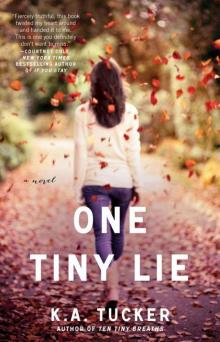 One Tiny Lie: A Novel
One Tiny Lie: A Novel Anomaly (Causal Enchantment)
Anomaly (Causal Enchantment)